► Third Renault driverless concept brings the French elegance
► Van den Acker goes big with marble, velvet and a near-6m length
► Proves there’s still hope for privacy, luxury and beauty in the autonomous future
Renault’s used its home motor show as an excuse to unveil the wild EZ Ultimo concept car, the third of its triptych of electric, self-driving future studies – and the most outlandish yet. Decadently proportioned and lovingly sculpted by Laurens van den Acker’s team, the EZ Ultimo is an app-booked Level 4 autonomous limo with an interior like a boutique hotel. Renault’s future-gazers reckon it’s a vehicle you might book for special occasions, or that the likes of an airline’s First Class lounge might use to ferry guests to and from the airport.
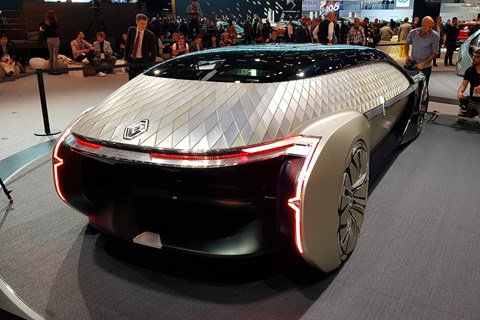
The EZ Ultimo, like the other two vehicles in Renault’s concept car series, is a response to CEO Carlos Ghosn’s announcement that a Renault robo-taxi will be a reality by 2022. It’s also designer Laurens van den Acker’s riposte to the notion that, in a future of ride-sharing, electrified, connected, autonomous pods, there is no place for emotive car design.
‘We were annoyed by this idea – that we’re all going be riding around in white boxes,’ smiles van den Acker. ‘I’m not saying we won’t – for most of us, 90% of the time, that will be the reality – but we won’t only be doing that. I like to think there is hope for design, even in this new world. Who wouldn’t want to be driven in this? Tell me this is a white box!’
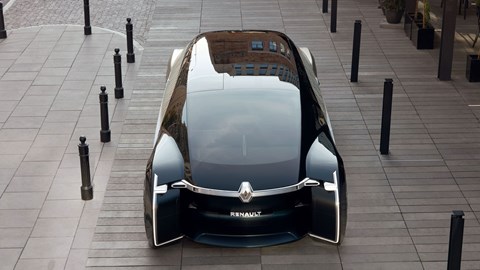
EZ Ultimo is not a white box. It might riff on familiar concept car themes – a lounge-like interior liberated of driving controls, architectural design influences – but it delivers them with such flair, particularly on the beautifully detailed interior, you’re happy to suspend disbelief.
The 1800kg package, such that it is, uses a single e-motor driving the front wheels, wireless charging to keep the 310-mile battery topped up and a magisterial body some 5.8 metres long but low like a supercar’s (1.35 metres high).
A pair of vast two-part doors unfurl to give access to the interior and its lone and very indulgent rear-facing front seat, which rotates to face the opened door for easier entry, and a rear bench seat. Gorgeous detailing abounds; moody lighting from lamps in pale gold, emerald green velvet seats, smooth marble, the herringbone parquet floor in American walnut, and controls that work with the tactile precision of a top-end stereo. And all the time the car’s signature lattice-like skin, inspired by the Prada store in Tokyo, creates a cosy cocoon of contemporary cool.
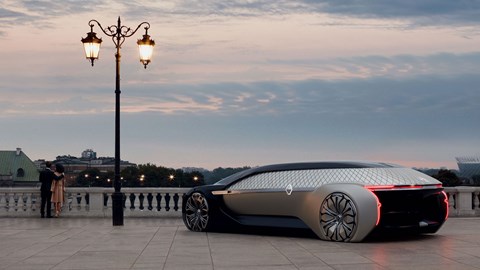
Renault’s director of concept car design Stephane Janin explains the thinking behind the lavish interior: ‘The arrival of autonomous technology means we need to think a lot about materials. After all, when you are no longer driving, they are one of the few things we as designers can play with. Currently we have all these points of interaction – the steering wheel, the gearshift lever – but in the future we will lose these.
The relationship you have with this machine will be completely different, and the materials will be more important. We have to make the difference in new ways. We are becoming more and more like an architect or an interior designer.’
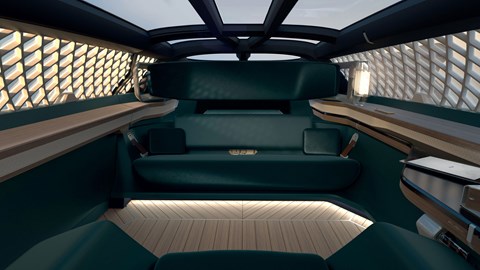
Certainly the detailing in the EZ Ultimo is special, from the bespoke refreshments flask to the wireless phone charging dock that rises from the shelf in which its invisibly embedded.
‘The few interfaces we have, they are very nice features,’ continues Janin. ‘We have heavy metal, these timeless rotary controls – it makes sense to do these for car lovers, even though you are not driving, because as a car lover you love all machines, like watches and aircraft. The proportions are also car-like. It is not tall and boxy but sleek.
Clearly, there are many questions. Questions like what makes Renault think it can go toe-to-toe with Maybach and Rolls-Royce in this sphere? And questions like how on earth an electric three-seater’s come in at nearly six metres long?
‘My boss Carlos is saying this is a big business and he wants us to take our fair share of it,’ continues van den Acker. ‘But we couldn’t resist doing something more exotic because people say that when we’re all using these robo-vehicles then design is dead. I needed to prove that we don’t agree.
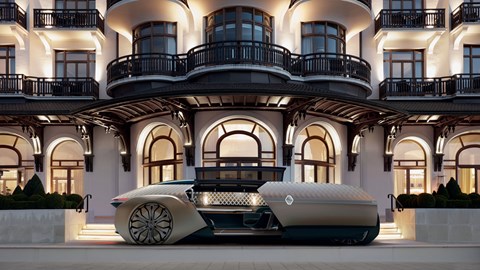
‘As Renault, we wondered if we were legit to go to this premium space. But the world is changing. My dad bought his cars; I lease mine. And when you think about selling time in this vehicle rather than the vehicle itself, then anybody could buy 10 miles in it and have a luxury experience. Renault is not a premium brand, evidently, but we are good at democratising innovations.’
And the lavish proportions? A smile. ‘It’s not discreet – it’s anything but – but this concept is not obnoxious. Buses in beautiful cities are visual pollution, so we wanted to reduce the silhouette so that we don’t detract from the beauty of our urban spaces. Besides, it’s more premium to be stretched out.’
Sexy, private, public transport? The future – Renault’s version of it, at least – is bright.